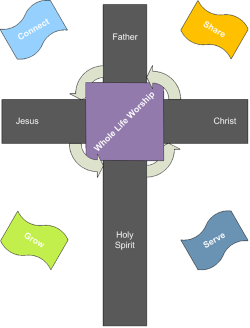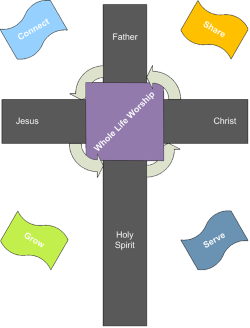What Are We Doing Here At Abundant Life? Share Part 1
 Pastor Marty
Pastor Marty  Tuesday, June 16, 2020 at 3:01PM
Tuesday, June 16, 2020 at 3:01PM Isaiah 53:6; Romans 3:9-11, 23; Ezekiel 18:20; Romans 6:23; John 3:16; Acts 4:12. This sermon was preached by Pastor Marty Bonner on Sunday June 14, 2020.
We have been talking about the purposes of the Church and its members. We will now look at the last purpose, which is to passionately share Jesus with those who do not know him. It can be seen as part of purpose #2. In a way, we are serving those who are lost by telling them the good news. However, since it is quite different then the ways we serve other believers, it is best to give it its own purpose. Unbelievers have only one overwhelming need and that is Jesus. Everything else pales. They need to connect to the Lord of life, and only those who know Jesus can help them do that. If you feed a person’s belly, but don’t help them connect to Christ then you have not helped them in the way that they needed. Of course, you can do both, but we must never lose sight of our true purpose in their life.
People need Jesus whether they know it or not, and Christians must be convinced of that enough to go out of our comfort zones. So today, let’s talk about the fact that people need to hear the good news of Jesus.
Each of us is a sinner
The first two passages that I have listed impress upon us that each person on this earth is a sinner. Even those who are trying to keep the righteousness of God fall short. It is interesting that people typically feel like they are doing a good enough job, and that their good outweighs their bad. However, the revelation from God tells us that this isn’t true.
Mankind wasn’t always this way. Back in Genesis chapters one and two, we are told that God created humans good and without sin. Yet, in Genesis three, Adam and Eve rebel against God’s command and purposefully sin. Sure, they were deceived, but they still knowingly broke God’s command. At this point, Adam and Eve entered into a fallen, dying state. This fallen state would also affect all of humanity that would come after them. The death that God warned them about was both physical and spiritual.
All humans born after Genesis three would also be dying beings who were separated from the direct presence of God. This may seem unfair, but there is no logical way around it. The choice of parents always affects what a baby experiences: where it is born, how well it is taken care of, whether or not it is raised for the Lord, and the list goes on. We can scope this out to recognize that the choice of families determines what a neighborhood experiences, and the choice of neighborhoods determines what a city experiences, and so to the state, nation, and ultimately the world.
Of course, there is more to this than just our choices. There is also the fact that the devil and his cohorts have interfered in our relationship with God.
Given enough time, every person born on this planet will become sinners. Isaiah is speaking about a people, Israel, who knew God’s law and yet he recognized that none of them were righteous before God. He revealed that God would one day put our sins upon another, the Messiah. I will talk more about that later. In the Romans passage, Paul also emphasizes that both Jews and Greeks (basically everybody that wasn’t Jewish) fall short of God’s glory because of their sin.
We are born to sinful parents, who are in a sinful world, and we have a propensity for sin, that is, a sinful nature. This is quite evident in each person. You do not have to teach a child to sin. It comes naturally. However, you do have to teach and train them to do what is right. This does not mean that everyone becomes as sinful as they can possibly be. It simply means that, in the middle of all our choices, none of us measures up to complete righteousness. It would be good for us to remember this in our social discussions and arguments. Usually, it is the first thing we jettison. When I am railing against someone else’s sin, I should remember that I too am a sinner.
How about the aborted baby, or the baby who dies within the first year? Technically they are not guilty of sin before God, but they are stuck in the human condition. They die and go into a spiritual holding place where all other humans have gone before them. Without Jesus, they would still be stuck there. There are some who have taught that we are born having inherited the guilt of Adam. I don’t believe that this is a proper reading of Romans 5:12 and other passages about the effect of the original sin. It was death and separation from God that spread to all the rest of us, not Adam’s guilt before God. However, if they had been allowed to live, they would have eventually become sinners too. At some point, they would become aware that they were doing something wrong and yet, would do it anyways. It is at that point that we become guilty before God for our own sins.
The judgment of God is upon us
Yes, man is a sinner, but Ezekiel tells us the decree of God. The soul who sins will die. The wages of sin is death. In Genesis 3, we see God meting out judgment. Though we could talk about painful childbirths and the sweat of our brow, the most important part of our punishment is that we die. Before that day, Adam and Eve were not as we are today, growing old and dying. However, this is not only true physically, but spiritually as well. They were kicked out of the Garden and were separated from the presence of God. This spiritual separation is the death of a relationship, but it also leads to an eternal spiritual death if it is not fixed. We will all be held guilty for our own sins, not the sins of our parents, or our neighbors. The question is not, did they sin, but what did I do because of their sin? Usually, we use it as an excuse for our own sin.
This sets up a dilemma, not in the sense that God was stumped and couldn’t figure it out, but in the sense that there is a tension between God’s love and His Righteousness. The Old Testament emphasizes both and even posits the need of a sacrifice to cover our sins. God is love, so He wants to save us. However, He is also just, so He cannot overlook our sins. It is easy for us to say, “He’s God! He can do anything that He wants.” However, we fail to recognize that God cannot quit being Himself. He is fully love and yet fully just. We can overlook sin because we are sinful humans. However, God is not.
Let’s look at an illustration. If someone raped and murdered a loved one of yours, and then was arrested, confessed, and proven guilty at trial, what would you think if the judge chose to overlook the case and simply let the guy go free? Something within us would cry out, “That’s not right!” Even if we weren’t bloodthirsty for his death, we would still think that something more than just letting him go should happen. We easily pick and choose when to demand justice and when not to, but God cannot. As Paul says in Romans 6:23, He must give us the wages that we deserve. The good news is that there is a way out of this, but we must not jump ahead of ourselves.
We cannot save ourselves
So, we are sinners, and therefore are under the judgment of God. This last point is that we cannot save ourselves. Many people will recognize the bad stuff of the world and its need for some kind of answer. However, God tells us that we are in a situation that no human or group of humans can fix by themselves.
The smartest and best individuals of humanity cannot fix the sinful nature that is within each of us. Paul says in Romans 3:23 that our attempts at righteousness fall short and are unacceptable. In fact, they are woefully short. Imagine someone giving you a glass of water, but it only has a couple of specks of feces in it. Is that acceptable? But, Lord, it is better than that other glass that is half full of crud. It doesn’t matter. A couple of specks of feces is still too much, and unacceptable. Another way to look at this is this. If the best among us only sin between one to three times a day, that is still between 365 to 1,000 times a year. Over a typical lifetime, we would amass between 25,000 to 75,000 sins, and this is the best-case scenario. If your plan to save yourself is to be a good person then hear what God’s Word is telling you. It won’t work. It falls woefully short in even the best of people, and most of us are average. If your plan is to follow the wise people of this world who can lead us into Utopia then hear what God’s Word says. It won’t work. It not only falls short, but always leads to a destructive end because humans are sinful. Globalism won’t solve our problem. It will only dismantle the protections that God installed at the Tower of Babel against an evil man ruling over the entire earth. This is exactly what the book of Revelation tells us is on the agenda for the last days. A man of sin will take over the earth and the world will eat it up. However, it will also bring great destruction upon the world.
No, our righteousness falls short and always will. What we need is God to do for us what we cannot do for ourselves. Jesus was, and still is, God’s solution for the world. Because He loved us, God sent His Son to pay the price for our sins. All who put their faith in him can have their sins covered by His righteousness, and then be justly allowed to join His family. Only God’s plan will work.
As we close, I want us to remember that there is a whole world of people in need of the truth before they leave this earth, which few get to know when that is. They are in the same situation that you were in before you met Jesus. They are lost and without hope. Some have never really heard the good news. Some have heard a little of it, but it is fuzzy and without resolution. Some have heard it, but also experienced a bad witness. Perhaps they were in a cult, or were hurt and wounded. Some have heard the gospel and have outright rejected Christ. Yet, God loves them. He made them to become like Him, to reflect His image, to dwell with Him. This is the plight of the world around us. They are under judgment and cannot save themselves. Oh, the need is great for laborers who will go out into the field and share the good news of who Jesus is. May God help us to have the guts to go do it!





